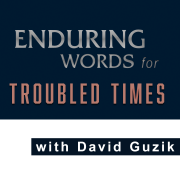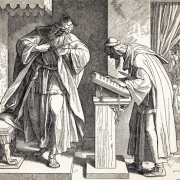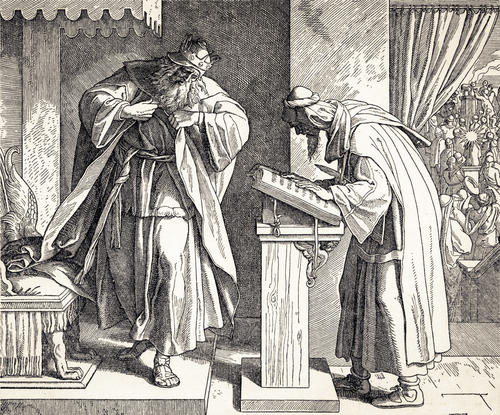
Dear Racist…
I know that is a provocative beginning, but I really want to say some things to the racist.
Racism can be seen in actions, but it is rooted in the heart and the mind, and I can’t read your mind – so I’m not here to diagnose your racism. I would like to communicate three main ideas, even though so much more can be said – so please judge me by what I say, much more than what I have not said here. Also, I say this to everyone – to every Christian, to every atheist, to everyone who believes in another religion or doesn’t think about religion at all. Here’s what I want to say:
- Your racism is a sin that you must repent of.
- Jesus Christ loves you – the racist – and He willingly sacrificed His life out of love for you.
- Because of what Jesus did and continues to do, you can be forgiven, transformed, and restored.
Let me spend some time talking about each one of these points.
First, your racism is a sin that you must repent of. I know that racism has several definitions, and people speak of racism in many different contexts. Here is the definition I will use: Racism is to judge others purely by their race, or to judge them first by their race, or to judge them mostly by their race, instead of as individuals. Racism is also to mistreat others based on their race, or to take pride and glory in your own race.
I don’t know if you think your racism is a sin – something that misses the mark of God’s will and our ultimate good. Maybe you think your racism is justified, and you give reasons based on what people of this race did to people of that race and so on. Maybe you aren’t guilty of the sin of racism. I can’t know that as I speak to you in a video, and I probably couldn’t know it even if I spoke you face to face. But to whatever extent you judge others purely by their race, or judge them first by their race, or judge them mostly by their race, that makes you guilty of racism. It’s especially true if you mistreat others based on their race, or if you take pride and glory because of your own race – to whatever extent those things are true, you are guilty of the sin of racism.
It’s important that you know why this is a sin. It is NOT a primarily a sin because the dominant culture thinks racism is an offence and a disgrace. It’s very hard for us to do, but we should not base our thinking on what the dominant culture thinks. As Romans 12:2 says, we should not be conformed to the world – the dominant culture – but be transformed by the renewing of our mind. At this point of time in the western world, “racist” is about the worst accusation you can make against another person. There are very, very few people who proudly proclaim themselves to be racists, because if they did, they would be strongly rejected by the dominant culture.
In general, racism is thought to be shameful and to disqualify a person from acceptance in the wider community. This is one reason why people are quick to accuse others of racism – because it is a powerful accusation. I’m sure there are some people who are not racists who are accused of it; and there are no doubt others who are in fact racists who are never accused of it. Even though our culture doesn’t use the word “sin” very much, racism is today considered to be a sin by the dominant culture – when in the past it was much more tolerated and approved of.
I say this make a point. Dear Racist: I do NOT call upon you to repent of racism because our dominant culture says it is a sin. In fact, that may be one of things that makes racism attractive to you. You may be attracted to racism because it goes against the dominant culture; it is one way that you resist being forced into the mold of the culture. Without at all approving of your racism, I understand the impulse of resisting conformity to the mold of the culture. It gives you an identity and a sense of meaning – you think you exist to stand against such things. That’s why I do not say, “Your racism is a sin you must repent of” because the culture condemns racism.
No, I say “Your racism is a sin you must repent of” because God says racism is a sin. The things God says are sin and things the culture says are sin may sometimes overlap, but something is not fundamentally wrong because the culture says it is sin. Something is wrong because God says it is wrong, and in the Bible, God says racism is wrong. Now, I know that some people think the Bible is racist – I want to keep this article short, so I won’t get into that – but there are lots of great resources out there that answer that accusation. I’ve been studying and teaching the Bible for 40 years and can honestly say that what the Bible teaches against racism, both in principle and command.
In principle, we are all descended from the same parents, Adam and Eve. We are all made in God’s image (Genesis 1:26-27; Genesis 9:6). As Acts 17:26 says, And He has made from one blood every nation of men to dwell on all the face of the earth. When God so loved the world that He gave His only begotten Son (John 3:16), He did it for all of humanity, for people of every race. Because of these and many, many other Biblical reasons, racism is wrong for everyone, Christian or not.
In command, we can simply go to what Jesus said was the second greatest commandment: to love your neighbor as yourself (Mark 12:31). If you treat your neighbor – which Jesus specifically defined as those of other races or ethnicities (Luke 10:25-37) – if you treat your neighbor as you want to be treated, you won’t be racist.
So if you are not a Christian – you are an atheist, or have another religion, or have no interest in religion at all – please know that you will one day stand before Jesus Christ as the judge of all things, and if you have hated your neighbor because of race, God will hold you to account for your sin of racism (among your other sins). If you don’t repent and deal with it now, God’s judgement on your racism and your other sins, especially your sin of rejecting God’s rescue in the person and work of Jesus Christ, will be part of your torment forever in eternity.
Yet the Christian has even more reason to reject racism – because Christians truly are all one in Jesus Christ, transcending the barriers of race, and class, culture, and gender. There will be people from every tribe and tongue and nation around God’s throne (Revelation 5:9), and it won’t be segregated according to race. So, if you are a Christian and you judge others purely by their race, or judge them first by their race, or judge them mostly by their race – you especially need to repent. If you mistreat others based on their race or take pride and glory because of your own race – you especially need to repent. Remember Galatians 6:14: But God forbid that I should glory, save in the cross of our Lord Jesus Christ. We boast in Jesus, and never in our race. As Christians, we have love and grace and declare the dignity of all men and women because they are made in the image of God, and we also feel a special kinship to fellow disciples of Jesus Christ.
Which brings me to a second point: Jesus Christ loves you – the racist – and He willingly sacrificed His life out of love for you. The dominant culture may hate you, the racist. You may even take pleasure in the fact that the dominant culture hates you! Whether you like what the culture thinks about you or do not like it, the truth remains: Jesus Christ loves you, the sinner. He doesn’t love you because of your sin; His reasons for loving you are found in Him, not in you. But God is rich in love and mercy, and Jesus Christ came to save sinners – including racists. He doesn’t want you to remain in your racism, but He loves you so much that Jesus willingly sacrificed His life out of love for you.
When I say that Jesus willingly sacrificed His life, what I mean is that at the cross, Jesus put Himself in the place of guilty sinners (Romans 5:8), and it was as if He said to God the Father, “Judge Me for their sin. Put their guilt and their shame and the judgement they deserve on Me.” Jesus did this for His people, and He did it regarding all that God considers sin – whether the culture approves those sins or hates those sins.
Dear Racist: Jesus loves you so much that we could say that He said to God the Father, “Take their sin of racism and put it on Me. Treat Me as the racist, and pour out Your holy wrath on Me for that sin. I will take it and bear it.” Again, I’m not talking about the wrath of the culture, but the wrath of God. Jesus carried it and satisfied it, and He did it out of love.
My final point is this: Because of what Jesus did and continues to do, you can be forgiven, transformed, and restored. What Jesus did on the cross was so far-reaching that it has the capacity to forgive every sin ever committed. But it only effectively forgives the sin of God’s people – those who come to God humbly, knowing they need to be rescued, and trusting in Jesus for their rescue – not trusting themselves in any way, but trusting in who Jesus is and what He did for us, especially what He did at the cross (His death for us) and at the empty tomb (His resurrection).
When we come to Jesus in faith and repentance, there is forgiveness – even for the racist. I say “faith and repentance” on purpose, because they go together. You can’t truly turn to Jesus unless you turn away from your sin, including the sin of racism. When we put our trust and love in Jesus in this way, we receive the gift of new life – and God continues His work in is, making us more and more like Jesus Christ. The changes don’t all happen at once, and they will never be completed on this side of eternity – but there should be some evidence of real change.
When we are made new people in Jesus Christ, it doesn’t automatically change our habits – our habits of thinking and our habits of doing. But as we continue trusting in Jesus, living for Him, and doing the basics of the Christian life, we will become more like Jesus, even in our habits of thinking and doing. God can forgive and transform the sinner, including the racist.
Sometimes when I hear racism discussed in our dominant culture, it sounds like it is the unforgiveable sin. The idea often seems to be, “once a racist, always a racist – you can never really be forgiven and transformed regarding this sin.” You need to know that this is not how it is in the kingdom of God. Jesus Christ, in who He is and what He has done for us, especially what He has done at the cross – Jesus brings forgiveness and begins transformation in all who believe and repent.
What does it look like to be a forgiven and transformed racist? One great example is John Newton, the author of the famous hymn “Amazing Grace.” He was in the shipping business and transported African slaves across the Atlantic – I guess you could say he was racist. Yet in a terrible storm, in fear for his life, he believed on Jesus and repented of his sins – and was truly converted. He eventually quit the slave business, and as a pastor he had a big influence on a man named William Wilberforce – the man who was instrumental in outlawing slavery in the entire British Empire. That’s both forgiveness and transformation. John Newton is just one example; there are countless others, and hopefully more every day.
Dear Racist: Let me end by simply repeating my three main ideas:
- Your racism is a sin that you must repent of.
- Jesus Christ loves you – the racist – and He willingly sacrificed His life out of love for you.
- Because of what Jesus did and continues to do, you can be forgiven, transformed, and restored.
Receive it today with faith and repentance – and let’s make a better world together.







